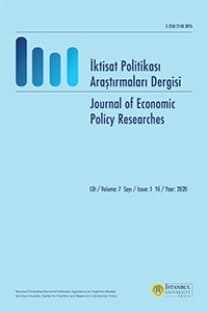2007-2008 Küresel Finansal Krizin Öngörülebilirliği Üzerine Tartışmalar
Küresel finansal kriz, Ana-akım İktisat, Makroekonomik modeller, İktisadın krizi, Stratejik görmezden gelme, Dinamik Stokastik Genel Denge (DSGE) modelleri
2007-2008 Discussions on Predictability of The Global Financial Crisis
Global financial crisis, Mainstream economics, Macroeconomic models, Crisis of economics, Strategic ignorance, Dynamic Stochastic General Equilibrium models,
___
- Akçay, Ü., (2014) “İktisadi Kriz ve Ana - Akım İktisadın Krizi”, İktisat Dergisi, Sayı: 527, s. 45-54.
- Bernanke, B., (2010) “On the Implications of the Financial Crisis for Economics.”, Princeton University, (Çevrimiçi) http://www.federalreserve.gov/, 20.9.2018.
- Bernanke, B., (2016) Karar Alma Cesareti, Yüzyılın En Büyük Finans Krizi ve Sonrası, Çev. Canan Feyyat, Metin Demirsar, İstanbul, Scala Yayıncılık.
- Bezemer, J. D., (2009) “No one saw this coming. Understanding Financial Crisis Through Accounting Models”, (Çevrimiçi) https://www.rug.nl/research/portal/files/2646456/09002_Bezemer.pdf, 2 Kasım 2018.
- Cochrane, J. H., (2009) “How did Paul Krugman Get It So Wrong?” (Çevrimiçi) http://ricardo.ecn.wfu.edu/~cottrell/ecn272/cochrane.pdf, 11.11.2016.
- Colander D., et.al., (2009) “The Financial Crisis and The Systemic Failure of Academic Economics”, Kiel Institute for the World Economy, Working Paper, No.1489: 1-17.
- Colander, D., (2010) “The Economics Profession, the Financial Crisis, and Method”, Middlebury College Economics Discussion Paper, No. 10-38.
- Davies, W., McGoey, L., (2012) “Rationalities of Ignorance: On Financial Crisis and the Ambivalence of Neoliberal Epistemology”, Economy and Society, (Çevrimiçi) https://doi.org/10.1080/03085147.2011.637331, 21.07.2018.
- Davis, E. P., Karim, D. (2008) “Could Early Warning Systems Have Helped to Predict the Sub-Prime Crisis?”, National Institute Economic Review, (Çevrimiçi) https://doi.org/10.1177%2F0027950108099841, 17 Ekim 2018.
- El-Erian, M. (2009) Piyasalar Çarpışınca: Küresel Ekonomik Değişim Çağı için Yatırım Stratejileri, Çev. Şehnaz Tahir Gürçağlar, İstanbul, Scala Yayıncılık.
- Feldstein, M. S., (2007) “Houseing, Credit Markets and the Business Cycle”, NBER Working Paper, (Çevrimiçi) https://www.nber.org/papers/w13471, 12 Kasım 2017.
- Gorton, G. B., (2018) Finansal Krizleri Yanlış Anlamak: Krizlerin Gelişini Neden Göremiyoruz? Çev. Mehmet Doğan, İstanbul, Boğaziçi Üniversitesi Yayınevi.
- Kansas, D., (2009) Wall Street’in Sonu, İstanbul, Türkiye İş Bankası Kültür Yayınları.
- Krugman, P., (2009) “How did Economist Get It So Wrong?”, (Çevrimiçi) http://www.nytimes.com/2009/09/06/magazine/06Economic-t.html, The New York Times, 10.11.2016.
- Krugman, P., (2015) Bunalım Ekonomisinin Geri Dönüşü ve Küresel Kriz, Çev. Neşenur Domaniç, 6. bs., İstanbul, Literatür Yayıncılık.
- Lawson, T., (2009) “The Current Economic Crises: Its Nature and the Course of Academic Economics”, Cambridge Journal of Economics, No. 33:759-777.
- Lucas, R. E., (2003) “Macroeconomic Priorities”, The American Review, (Çevrimiçi), http://www.princeton.edu/~markus/misc/Lucas2003.pdf, 7 Haziran 2017.
- Lucas R., E., (2009) “In Defence of the Dismal Science”, The Economist, (Çevrimiçi) http://www.economist.com/node/14165405, 15.11.2016.
- McGoey, L., (2012) “The Logic of Strategic Ignorance”, The British Journal of Sociology, (Çevrimiçi) https://doi.org/10.1111/j.1468-4446.2012.01424.x, 11 Ekim 2016.
- Obstfeld, M., Rogoff, K., (2009) “Globol Imbalances and the Financial Crisis: Product of Common Causes”, Federal Reserve Bank of San Francisco Asia Economic Policy Conference, Santa Barbara.
- Osmanoğlu, H., (2012) Finansal Krizin Gizli Doğası: Maça Kızı Efekti, İstanbul, Cinius Yayınları.
- Rajan, R. G., (2005) “Has Financial Development Made the World Riskier”, NBER Working Paper, No.11728: 1-42.
- Rajan, R. G., (2011) “Why Did Economists not Foresee the Crisis?”, Project Syndicate, (Çevrimiçi) http://faculty.haas.berkeley.edu/mopp/Research/Rajan.pdf, 07.10.2016.
- Reinhart, C. M., Rogoff, K. S., (2010) Bu Defa Farklı: Finansal Çılgınlığın 800 Yıllık Tarihi, Çev. Levent Konyar, İstanbul, NTV Yayınları.
- Roubini, N., Mihm, S. (2012) Kriz Ekonomisi: Dünya Ekonomisinin Çöküşü ve Geleceği, Çev. Işıl Tezcan, İstanbul, Pegasus Yayınları.
- Saint – Paul, G., (2009) “A ‘Modest’ Intellectual Discipline”, (Çevrimiçi) http://voxeu.org/article/modest-intellectual-discipline-defence-contemporary-economics, 16.11.2016.
- Semmler, W., Gong, G., (2008) “Keynes and Modern Macroeconomics”, Middle East Technical University Studies in Development, 35(1): 29-60.
- Shiller, R. J., (2013) “Is Economics a Science?”, (Çevrimiçi) https://www.theguardian.com/business/economics-blog/2013/nov/06/is-economics-a-science-robert-shiller, 20.09.2016.
- Spaventa, L., (2009) “Economists and Economics: What Does the Crisis Tell Us?”, Center for Policy Research Policy Insight, No: 38: 132-142.
- Stiglitz, J. E., (2011) “Rethink Macroeconomics: What Failed, and How to Repair It”, (Çevrimiçi) https://doi.org/10.1111/j.1542-4774.2011.01030.x, 19.08.2016.
- Taleb, N. N., (2015) Siyah Kuğu: Olanaksız Görünenin Etkisi, Çev. Nazan Arıbaş, 6. bs., İstanbul, Varlık Yayınları.
- Terkel, A., (2009) “Cheney: No One Could Have Predicted the Financial Crises, Just as No One Foresaw 9/11”, (Çevrimiçi) https://thinkprogress.org/cheney-no-one-could-have-predicted-the-financial-crisis-just-as-no-one-foresaw-9-11-664c49473480#.d9fp67fzc, 10.10.2016.
- Tovar, C. E., (2008) “DSGE Models for Policy Analysis at Central Banks: An Overview of Issues and Challenges”, Bank for International Settlements (BIS), (Çevrimiçi) http://www.hkimr.org/uploads/seminars/163/sem_paper_0_288_tovar-dsge-models-for-policy-analysis-at-central-banks.pdf, 12 Kasım 2017.
- Uygur, E., (2012) “Küresel Bunalım, İktisat Politikaları, Yöntemleri ve Eğitimi”, Türkiye Ekonomi Kurumu Tartışma Metni.
- Wainer, H., (2007) “The Most Dangerous Equation”, American Scientist, p. 249-256.
- Wolf, M., (2004) “America is Now on the Comfortable Path to Ruin”, Financial Times.
- Yayın Aralığı: Yılda 2 Sayı
- Başlangıç: 2014
- Yayıncı: İstanbul Üniversitesi
Bankacılık Sektöründe Kredi Riskinin Temel Belirleyicilerine Yönelik Ampirik Bir Çalışma
Lojistik Faaliyetlerin Akdeniz Ülke Ekonomileri İle İlişkisi
Şule GÜNGÖR, Elifcan DURSUN, Ahmet KARAOĞLAN
Reel faiz oranı ve gelir eşitsizliği üzerindeki etkisi
2007-2008 Küresel Finansal Krizin Öngörülebilirliği Üzerine Tartışmalar
